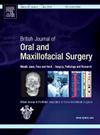The impact of the large language model ChatGPT in oral and maxillofacial surgery: a systematic review
IF 1.9
4区 医学
Q3 DENTISTRY, ORAL SURGERY & MEDICINE
British Journal of Oral & Maxillofacial Surgery
Pub Date : 2025-06-01
DOI:10.1016/j.bjoms.2025.03.006
引用次数: 0
Abstract
This systematic review evaluates the impact of the large language model (LLM) ChatGPT in oral and maxillofacial surgery. Following PRISMA guidelines and registered in PROSPERO (CRD42024625882), the study involved a comprehensive search across PubMed/Medline, Embase, Scopus, and Science Direct. Inclusion criteria focused on ChatGPT’s use in clinical decision-making, surgical planning, patient education, and research. Ten studies were reviewed, assessing ChatGPT’s performance in diagnostic accuracy, surgical efficiency, and patient satisfaction. GPT-4 achieved the highest accuracy (76.8%) in multiple-choice questions but showed variability, with lower performance in pharmacology and complex clinical scenarios. It excelled in generating informed consent documents, outperforming other AI models and human residents in accuracy, completeness, and readability. It also provided accurate and supportive responses in postoperative follow up. However, limitations were noted in handling complex clinical decisions and providing personalised advice for cases such as oral cancer and orthognathic surgery. While ChatGPT shows potential in improving patient communication, reducing healthcare workloads, and providing up-to-date information, its current limitations in accuracy and personalisation underscore the need for human supervision and integration with clinical databases. AI tools like ChatGPT can complement, but should not replace, human judgment in specialised fields such as oral and maxillofacial surgery.
大语言模型ChatGPT在口腔颌面外科中的影响:系统综述。
本系统综述评估了大语言模型(LLM) ChatGPT在口腔颌面外科手术中的影响。遵循PRISMA指南并在PROSPERO注册(CRD42024625882),该研究涉及PubMed/Medline、Embase、Scopus和Science Direct的综合检索。入选标准侧重于ChatGPT在临床决策、手术计划、患者教育和研究中的应用。我们回顾了10项研究,评估了ChatGPT在诊断准确性、手术效率和患者满意度方面的表现。GPT-4在多项选择题中准确率最高(76.8%),但在药理学和复杂的临床场景中表现较差。它在生成知情同意文件方面表现出色,在准确性、完整性和可读性方面优于其他人工智能模型和人类居民。在术后随访中也提供了准确和支持性的反应。然而,在处理复杂的临床决策和为口腔癌和正颌手术等病例提供个性化建议方面存在局限性。虽然ChatGPT在改善患者沟通、减少医疗工作量和提供最新信息方面显示出潜力,但其目前在准确性和个性化方面的局限性强调了人工监督和与临床数据库集成的必要性。ChatGPT等人工智能工具可以补充,但不应取代口腔颌面外科等专业领域的人类判断。
本文章由计算机程序翻译,如有差异,请以英文原文为准。
求助全文
约1分钟内获得全文
求助全文
来源期刊
CiteScore
3.60
自引率
16.70%
发文量
256
审稿时长
6 months
期刊介绍:
Journal of the British Association of Oral and Maxillofacial Surgeons:
• Leading articles on all aspects of surgery in the oro-facial and head and neck region
• One of the largest circulations of any international journal in this field
• Dedicated to enhancing surgical expertise.

 求助内容:
求助内容: 应助结果提醒方式:
应助结果提醒方式:


